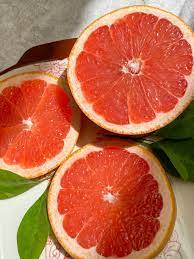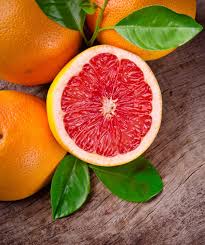Grapefruit petals typically refer to the delicate, thin, and often translucent segments of the outermost part of a grapefruit fruit. The grapefruit (Citrus paradisi) is a subtropical citrus fruit known for its slightly bitter and tangy flavor. The fruit is composed of several parts, including the outer peel, which consists of the thicker rind and the thinner, more delicate grapefruit petals.
Grapefruits petals are thin, flat, and usually semi-transparent. They have a slightly yellow to pinkish hue, depending on the ripeness of the fruit. The petals are often arranged in sections within the fruit. The texture of grapefruit petals is tender and delicate, making them easy to separate from the inner fruit. They are not as fibrous or tough as the rind and have a soft, pliable quality.
The flavor of grapefruit spetals is similar to the pulp of the grapefruit but milder and less intense. They possess a refreshing and citrusy taste, with a blend of sweetness and a hint of bitterness characteristic of grapefruits.
The aroma of grapefruit petals is citrusy and fragrant, with a pleasant and invigorating scent. It contributes to the overall citrus aroma of the fruit. Grapefruit petals can be used in various culinary applications. They are often used as a garnish for desserts, salads, beverages, or as an ingredient in recipes to add a burst of citrus flavor and visual appeal. Grapefruit petals are the thin, translucent segments of the outer part of a grapefruit, offering a mild citrus flavor and a variety of culinary uses
The Economic Importance and Uses of Grapefruit Petals

Grapefruit petals, also known as grapefruit blossoms or flowers, have limited economic significance compared to other parts of the grapefruit plant (Citrus × paradisi). However, they do have certain uses and potential economic importance, albeit to a lesser extent.
Here are some potential economic uses and benefits of grapefruit petals:
1. Aromatherapy and Fragrance Industry: Grapefruit petals, like many other flower petals, contain essential oils and compounds that contribute to a pleasant aroma. These oils can be extracted and used in the production of perfumes, essential oils, air fresheners, and other fragranced products.
2. Floral and Ornamental Industry: Grapefruit petals are visually appealing and can be used in floral arrangements, bouquets, and decorative purposes. They may be used in various events, ceremonies, weddings, and other occasions where flowers are used for aesthetic purposes.
3. Herbal and Medicinal Uses: While the fruit and other parts of the grapefruit plant are more commonly utilized for their medicinal properties, grapefruit petals can also have certain herbal uses. They may be used in traditional medicine or home remedies for their potential health benefits.
4. Culinary and Garnishing: Grapefruits petals can be used as a garnish in culinary applications to add visual appeal to dishes. They might be used in salads, desserts, or as a decorative element for cocktails and other beverages.
5. Beverage Production: The essential oils and flavors extracted from grapefruit petals can be used in the production of flavored beverages such as teas, infusions, or natural flavorings for juices and sodas.
6. Art and Crafts: Grapefruits petals can be dried and used in various art and craft projects. They can be incorporated into potpourri, scented sachets, or used in handmade papermaking.
7. Potential in Herbal Teas: Some petals of citrus plants, including grapefruit, are used to make herbal teas. These teas are often consumed for their potential health benefits and pleasant aroma.
8. Natural Dyes: Grapefruit petals, like many flower petals, can be used as a source of natural dyes. They can impart colors ranging from pale yellows to pinks and oranges, and these natural dyes can be used in textile dyeing, fabric art, and other crafts.
9. Educational and Research Purposes: Grapefruits petals can be utilized in educational settings for teaching botany, floral biology, or plant anatomy. Researchers may also use grapefruit petals for studying various aspects of plant development, physiology, or biochemistry.
Read Also: Currant Flowers: Economic Importance, Uses and By-Products
10. Cosmetic and Skincare Industry: The essential oils extracted from grapefruits petals may be used in the cosmetic and skincare industry. They can be used in the production of natural skincare products like lotions, creams, and other beauty products.
11. Horticulture and Gardening: Grapefruit petals, being attractive and fragrant, can be utilized in ornamental gardens and landscaping. They contribute to the overall aesthetics of gardens and can attract pollinators like bees and butterflies.
12. Educational Gardens and Museums: Grapefruits petals may be featured in botanical gardens, educational gardens, or museum exhibits to showcase the plant’s various parts and their uses.
13. Environmental and Landscape Photography: Grapefruits petals can be used in photography for various artistic or commercial purposes, especially in the field of landscape and environmental photography.
The Products and By-products That Can Be Derived From Grapefruit Petals
Grapefruit petals, though not typically a significant source of commercial products, can still be utilized in various ways to derive certain products and by-products. It’s important to note that grapefruit petals are not as commonly used or studied for commercial purposes compared to other parts of the grapefruit (e.g., fruit, peel, seeds). However, here are potential uses:
1. Essential Oil: Extracting essential oil from grapefruit petals is possible. Grapefruit essential oil is known for its citrusy aroma and potential health benefits. It’s commonly used in aromatherapy, perfumes, and skincare products due to its refreshing and uplifting properties.
2. Potpourri: Dried grapefruit petals can be used in potpourri blends to add a pleasant fragrance to living spaces. Mixed with other dried flowers and aromatic herbs, grapefruit petals contribute to creating a pleasing and fragrant potpourri mix.
3. Natural Dyes: Grapefruit petals can be used to extract natural dyes for fabric and other materials. The petals can impart a range of yellow to orange hues, depending on the extraction process and mordants used.
4. Floral Infusions: Grapefruit petals can be used to make floral infusions, creating beverages like grapefruit petal tea. The petals can be dried and steeped in hot water to create a unique and aromatic beverage.
5. Edible Decorations: Fresh or dried grapefruit petals can be used as edible decorations in salads, desserts, and cocktails. They can add a burst of color and a subtle citrus flavor to various culinary creations.
6. Crafts and Artwork: Grapefruit petals can be used in various crafts and artwork, such as pressed flower art, homemade cards, or decorative elements in candles and soap making.
7. Compost or Fertilizer: After extracting essential oil or using the petals for various purposes, the remaining grapefruit petals can be composted to enrich the soil as a natural fertilizer.
8. Herbal Infusions and Teas: Dried grapefruit petals can be used to make herbal infusions or teas by steeping them in hot water. These infusions may have a mild citrus flavor and potential health benefits associated with grapefruit, although in a milder form compared to grapefruit juice.
9. Sachets and Drawer Fresheners: Dried grapefruit petals can be placed in sachets and used as drawer fresheners to impart a pleasant aroma to clothes and linens.
10. Natural Cosmetics: Grapefruit petal extracts may be used as an ingredient in natural cosmetics, such as face masks, lotions, or creams, for their potential skin-soothing and antioxidant properties.
11. Potentially Bioactive Compounds: Research is ongoing to identify potential bioactive compounds in grapefruit petals that could have medicinal or functional properties. These could include antioxidants, flavonoids, and other phytochemicals.
12. Floral Waters or Hydrosols: The steam distillation of grapefruit petals can produce floral water or hydrosol, which may have a milder aroma compared to essential oil. Floral waters can be used in skincare or as a natural ingredient in various products.
13. Animal Feed Additives: Processed grapefruit petals might be used as a dietary supplement for animals due to potential nutritional benefits. However, research and testing are necessary to ensure safety and efficacy.
14. Biodegradable Packaging Materials: Extracts from grapefruit petals could be used in the development of biodegradable or eco-friendly packaging materials due to potential properties that enhance biodegradability.
In conclusion, it is important to emphasize that extensive research, safety assessments, and appropriate processing methods are necessary before utilizing grapefruit petals for these purposes. Additionally, it’s essential to ensure sustainable and responsible sourcing and processing to minimize environmental impact and promote ethical practices. Always consult with experts and adhere to safety and regulatory guidelines when exploring novel uses of botanical materials.

